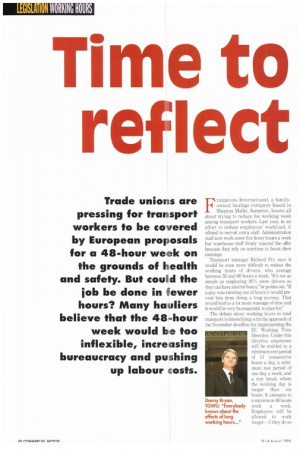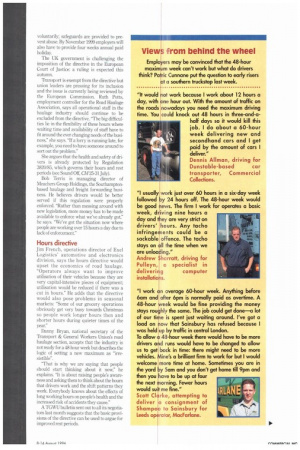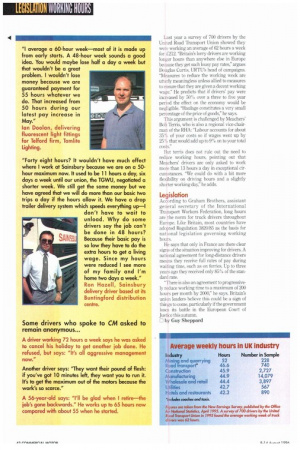Time to reflect
Page 42

Page 43

Page 44

If you've noticed an error in this article please click here to report it so we can fix it.
Framptons International, a familyowned haulage company based in Shepton Mallet, Somerset, knows all about trying to reduce the working week among transport workers. Last year. in an effort to reduce employees' workload, it offered to recruit extra staff. Administration staff now work some five fewer hours a week but warehouse staff firmly rejected the offer because they rely on overtime to boost their earnings.
Transport manager Richard Fry says it would be even more difficult to reduce the working hours of drivers, who average between 55 and 60 hours a week. "It's not as simple as employing 20% more drivers so they can have shorter hours," he points out. "If a guy was running out of hours it would prevent him from doing a long journey. That would lead to a lot more wastage of time and it would he very bureaucratic to plan for."
The debate about working hours in road transport is intensifying with the approach of the November deadline for implementing the EL Working Time Directive. Under this directive employees will be entitled to a minimum rest period of 11 consecutive hours a day, a minimum rest period of one day a week, and a rest break where the working day is longer than six hours. It amounts to Donny Bryan, a maximum 48 hours TGWU: "Everybody work a week.
knows about the Employees will be effects of long allowed to work working hours..." longer if they do so
voluntarily; safeguards are provided to prevent abuse. By November 1999 employers will also have to provide four weeks annual paid holiday.
The UK government is challenging the imposition of the directive in the European Court of Justice: a ruling is expected this autumn.
Transport is exempt from the directive but union leaders are pressing for its inclusion and the issue is currently being reviewed by the European Commission. Ruth Potts, employment controller for the Road Haulage Association, says all operational staff in the haulage industry should continue to be excluded from the directive. "The big difficulties lie in the flexibility of these hours where waiting time and availability of staff have to fit around the ever changing needs of the business," she says. "If a lorry is running late, for example, you need to have someone around to sort out the problem."
She argues that the health and safety of drivers is already protected by Regulation 3820/85, which governs their hours and rest periods (see Sound Off, CM 25-31 July).
Bob Terris is managing director of Meachers Group Holdings, the Southamptonbased haulage and freight forwarding business. He believes drivers would be better served if this regulation were properly enforced. "Rather than messing around with new legislation, more money has to be made available to enforce what we've already got," he says. "We've got the situation now where people are working over 15 hours a day due to lack of enforcement."
Hours directive
Jim French, operations director of Exel Logistics' automotive and electronics division, says the hours directive would upset the economics of road haulage. "Operators always want to improve utilisation of their vehicles because they are very capital-intensive pieces of equipment; utilisation would be reduced if there was a cut in hours." He adds that the directive would also pose problems in seasonal markets: "Some of our grocery operations obviously get very busy towards Christmas so people work longer hours then and shorter hours during quieter times of the year."
Danny Bryan, national secretary of the Transport & General Workers Union's road haulage section, accepts that the industry is not ready for a 48-hour week but describes the logic of setting a new maximum as "irresistible".
"That is why we are saying that people should start thinking about it now," he explains. "It is about raising people's awareness and asking them to think about the hours that drivers work and the shift patterns they work. Everybody knows about the effects of long working hours on people's health and the increased risk of accidents they cause."
A TGWU bulletin sent out to all its negotiators last month suggests that the basic provisions of the directive can be used to argue for improved rest periods. Last year a survey of 700 drivers by the United Road Transport Union showed they were working an average of 62 hours a week for £212. "Britain's lorry drivers are working longer hours than anywhere else in Europe because they get such lousy pay rates," argues Douglas Curtis, URTU's head of campaigns. "Measures to reduce the working week are utterly meaningless unless allied to measures to ensure that they are given a decent working wage." He predicts that if drivers' pay were increased by 50% over a three to five year period the effect on the economy would be negligible. "Haulage constitutes a very small percentage of the price of goods," he says.
This argument is challenged by Meachers' Bob Ten-is, who is also a regional vice-chairman of the RHA: "Labour accounts for about 35% of your costs so if wages went up by 25% that would add up to 9% on to your total costs."
But terris does not rule out the need to reduce working hours, pointing out that Me.achers' drivers are only asked to work more than 13 hours a day in exceptional circumstances. "We could do with a bit more flexibility on driving hours and a slightly shorter working day," he adds,
Legislation
According to Graham Brothers, assistant general secretary of the International Transport Workers Federation, long hours are the norm for truck drivers throughout Europe. Like Britain, most countries have adopted Regulation 3820/85 as the basis for national legislation governing working hours.
He says that only in France are there clear signs of the situation improving for drivers. A national agreement for long-distance drivers means they receive full rates of pay during waiting time, such as on ferries. Up to three years ago they received only 85% of the standard rate.
"There is also an agreement to progressively reduce working time to a maximum of 200 hours per month by 2000," he says. Britain's union leaders believe this could be a sign of things to come, particularly if the government loses its battle in the European Court of Justice this autumn.
CI by Guy Sheppard








































































































